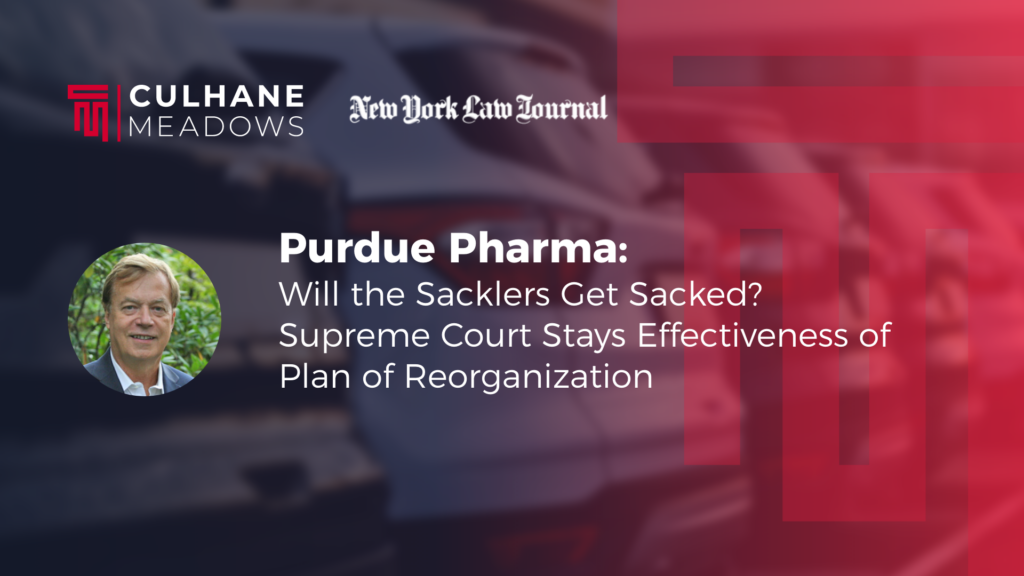Culhane Meadows’ New York partner, Robert Dremluk, recently authored an article about the U.S. Supreme Court intervening in a significant bankruptcy case involving Purdue Pharma, temporarily staying a Second Circuit ruling that allowed nonconsensual third-party releases of claims against non-debtors, which has been published by the New York Law Journal.
Here are a few excerpts from Robert’s article:
On Aug. 10, 2023, the U.S. Supreme Court stayed a decision of the U.S. Court of Appeals for the Second Circuit that held that nonconsensual third-party releases of direct claims against nondebtors are statutorily permitted under sections 105(a) and 1123(b)(6) of the Bankruptcy Code and that the court’s case law allows for nonconsensual third-party claim releases in specific circumstances.
…
Factual Background
In the 1950’s the Sackler family purchased Purdue Pharma LP and held various director and officer positions. In 1995, Purdue developed and obtained approval from the U.S. Food and Drug Administration for OxyContin. Purdue aggressively marketed OxyContin while downplaying growing addiction concerns that had arisen.
Starting in 2000, state governments began to alert Purdue to the widespread abuse of OxyContin. Subsequently, lawsuits against Purdue—brought by individuals, state governments and federal agencies—proliferated across the United States. On Sept. 15, 2019, Purdue and related entities filed for bankruptcy protection.
…
Split of Authority Among Circuit Courts
Whether to approve nonconsensual nondebtor releases in a plan of reorganization has resulted in a split of authority among federal circuit courts. The U.S. Courts of Appeals for the Fifth, Ninth and Tenth Circuits ban such releases. While releases are permitted, albeit sparingly, in the U.S. Courts of Appeals for the Second, Third, Fourth, Sixth, Seventh and Eleventh Circuits. The First and Eighth are silent on this issue.
…
Second Circuit Issues Majority and Concurring Opinions
Majority Opinion
The majority addressed two primary questions: whether the bankruptcy court had the authority to approve the nonconsensual release of direct third-party claims against nondebtors, and whether the text of the Bankruptcy Code, factual record and equitable considerations support the bankruptcy court’s approval of the plan.
…
Concurring Opinion
A concurring opinion by Judge Richard Wesley of the U.S. Court of Appeals for the Second Circuit challenged the majority’s reliance on two purely equitable provisions of the Bankruptcy Code to support approval of nondebtor nonconsensual releases. He invited review by the Supreme Court noting that, “[t]he question, which has divided the courts of appeals for decades, would benefit from nationwide resolution by the Supreme Court.”
…
Release of Direct and Derivative Claims
Claims to be released against the Sacklers fit into one of two categories: direct claims and derivative claims. Direct claims are causes of action brought to redress direct harm to a plaintiff caused by a non-debtor third party. By contrast, derivative claims are ones that arise from harm done to the estate and that seek relief against the third party for harm caused to the estate.
…
Takeaways
Under the Bankruptcy Code, claims for fraud or other bad conduct against an individual debtor are not dischargeable. However, the bankruptcy statute is silent with respect to what a court can or cannot do with respect to releasing certain debtor relevant claims involving a nondebtor individual.
…
Conclusion
While treatment of third-party nonconsensual releases is far from settled, the bankruptcy system may work as evidenced by the fact that more than 95% of the 120,000-plus votes submitted were in favor of confirmation and out of almost 5,000 state and local governmental creditors, almost 97% voted to accept the Purdue plan.
…
To read the entire article, click HERE
About Culhane Meadows – Big Law for the New Economy®
The largest woman-owned national full-service business law firm in the U.S., Culhane Meadows fields over 70 partners in eleven major markets across the country. Uniquely structured, the firm’s Disruptive Law® business model gives attorneys greater work-life flexibility while delivering outstanding, partner-level legal services to major corporations and emerging companies across industry sectors more efficiently and cost-effectively than conventional law firms. Clients enjoy exceptional and highly-efficient legal services provided exclusively by partner-level attorneys with significant experience and training from large law firms or in-house legal departments of respected corporations. U.S. News & World Report has named Culhane Meadows among the country’s “Best Law Firms” in its 2014 through 2022 rankings and many of the firm’s partners are regularly recognized in Chambers, Super Lawyers, Best Lawyers and Martindale-Hubbell Peer Reviews.
The foregoing content is for informational purposes only and should not be relied upon as legal advice. Federal, state, and local laws can change rapidly and, therefore, this content may become obsolete or outdated. Please consult with an attorney of your choice to ensure you obtain the most current and accurate counsel about your particular situation.




